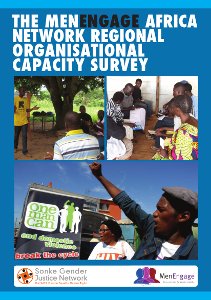In June 2011, Sonke published the MenEngage Africa Network Regional Organisational Capacity Audit report. The audit contains findings that will inform future capacity building interventions across the MenEngage Africa Network to promote work with men and boys for gender equality throughout the continent. “This document provides an exciting roadmap to advance the collective work for gender equality in the African region,” states Dean Peacock, Executive Director for Sonke.

Priorities for the regional network include establishing links with other social justice movements, particularly the women’s movement, and creating a shared policy and advocacy agenda amongst its members. To further these priorities, the MenEngage Africa Network steering committee implemented the MenEngage Africa Network Regional Organisational Capacity Audit to identify existing capacity, focus areas and skills of member organisations, as well as training and support needs. Sonke administered this audit on behalf of the MenEngage Africa Network in October and November 2010.
The questionnaire administered for the capacity audit is based on similar audits undertaken by MenEngage South Asia and MenEngage North America. The questions were adjusted to capture information specific to gender work in the African region, and contained questions on organisational demographics, strengths and weaknesses, training needed, knowledge on relevant laws and policies, interest in engaging policy makers and parliamentarians, and assistance organisations can provide to members of the MenEngage Africa Network. The questionnaire was distributed using an online survey, via email, and in hard copy. Sonke received a total of 69 responses from international organisations, non-governmental organisations (NGOs), community based organisations, donors and academics.
Key findings overview
The survey responses indicate that organisations have clear programmatic strengths in behavioural change approaches, community-based interventions, and networking and coalition building. A majority of respondents indicate three primary areas of weakness: work with parliamentarians; law and policy reforms; and conducting qualitative and quantitative research. Organisations are split in their abilities regarding mass media campaigns, advocacy, and monitoring and evaluation of programmes.
Significantly, respondents are both keen to receive training in their identified areas of weakness and willing to assist in training others. A majority of respondents indicate that they view the MenEngage Africa Network as “very useful” and would like to collaborate with the Network. This is a clear endorsement for MenEngage Africa to continue to develop its role in supporting regional initiatives to promote gender equality through work with men and boys.
Moving forward
The report concludes with suggested next steps for the MenEngage Africa Network, which include to:
- provide training in areas of weakness;
- develop programmes and strategies that build on the network’s strengths; and
- design initiatives to meet identified needs, such as addressing gaps in policy and engaging with parliamentarians.
These activities will build the capacity of individual country networks, partners and the African regional alliance, and will add to the momentum for increased engagement of men and boys for gender equality.
